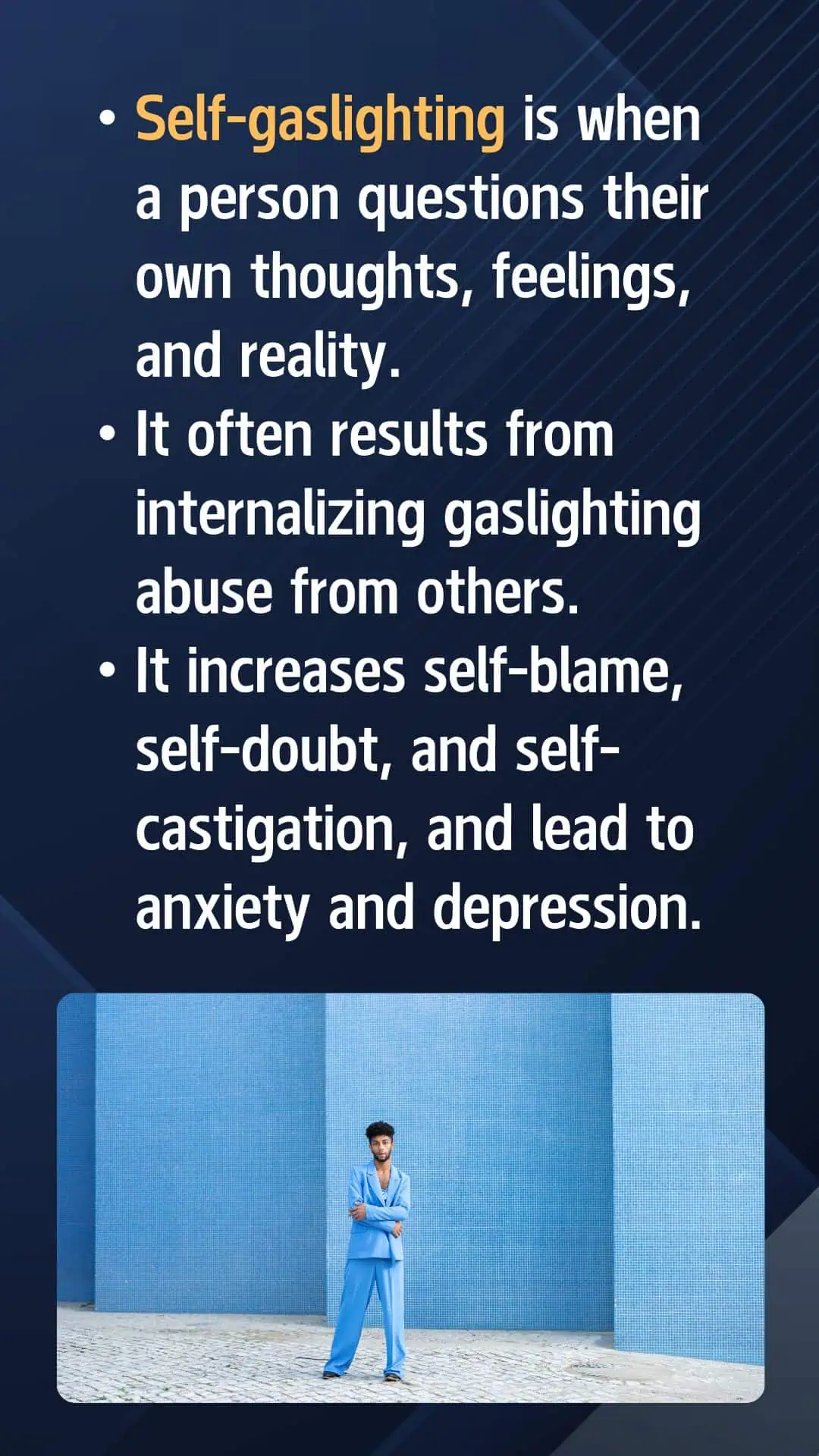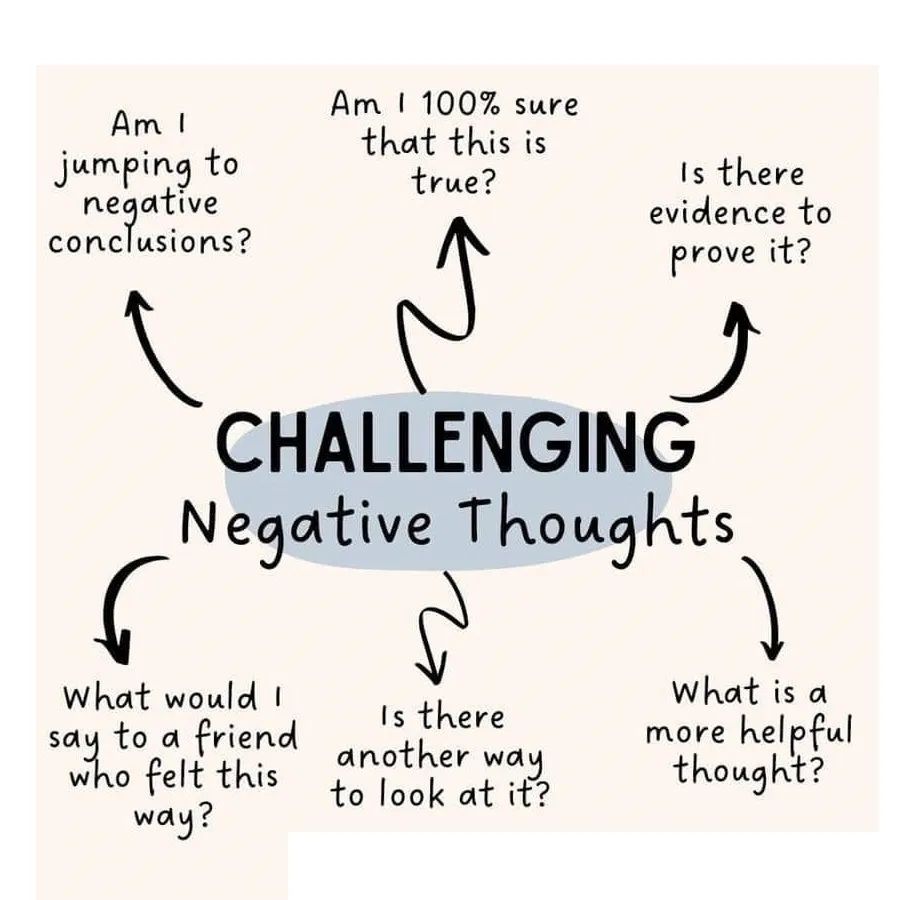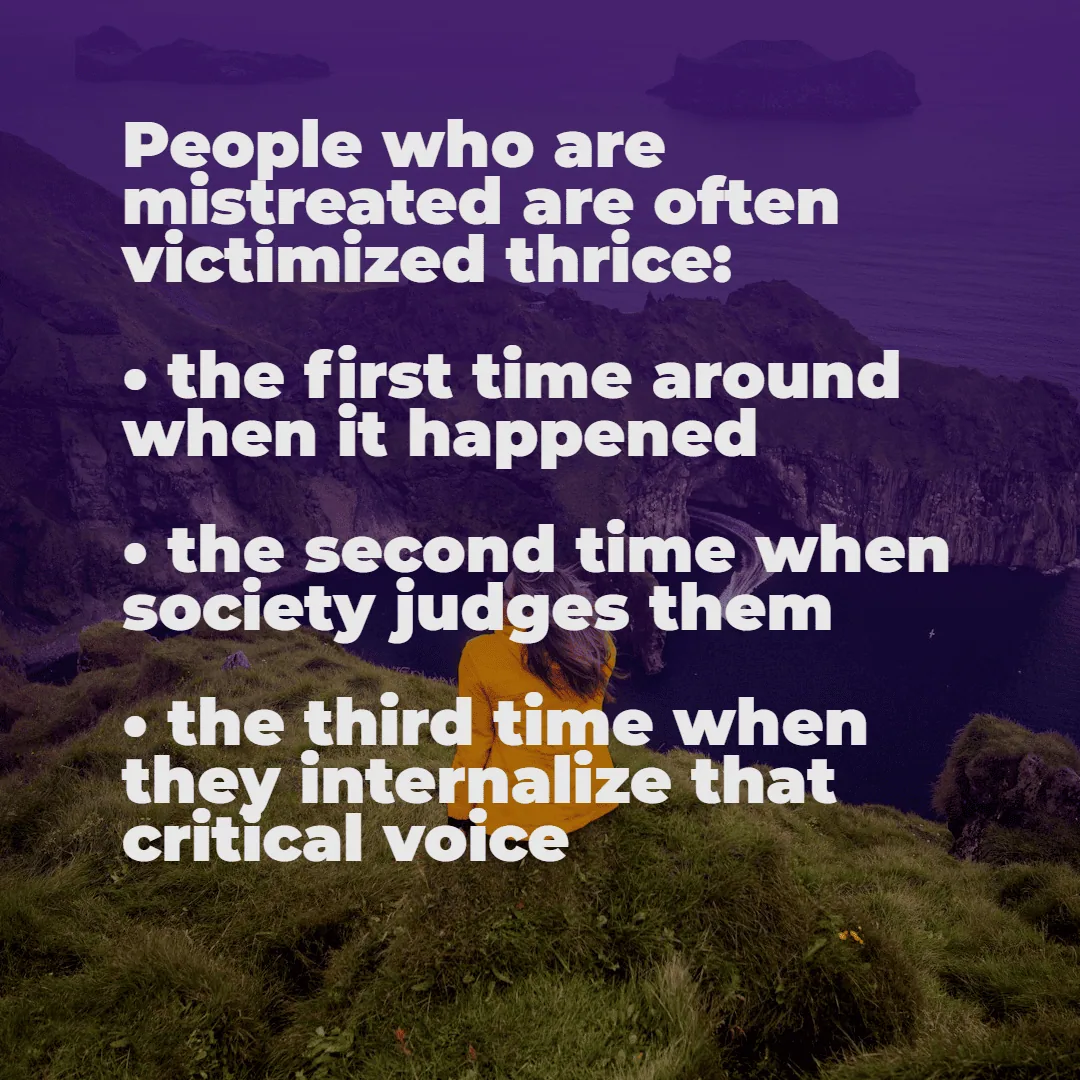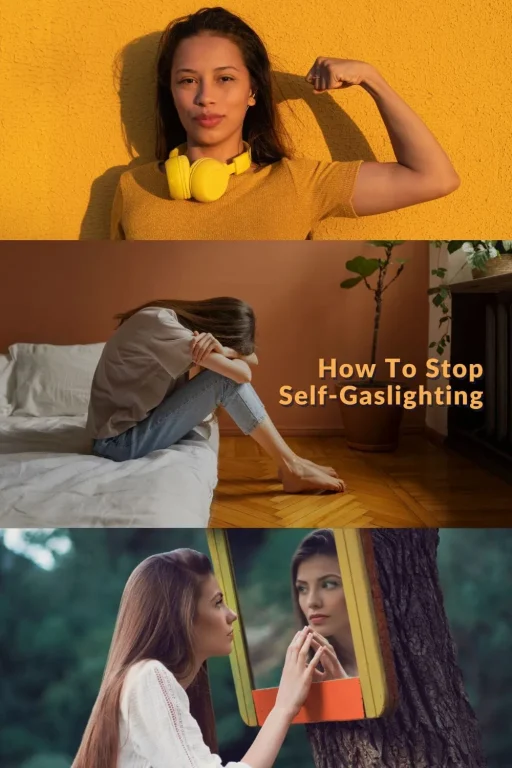Today's Sunday • 8 mins read
— By Dr. Sandip Roy.
You think it’s justifiable,
I think it’s pretty cruel
And you know you lie best
when you lie to you.
— The Chicks
Self-gaslighting could turn you into your own worst critic. It may cause you to tell yourself repeatedly that your abilities are questionable, your accomplishments unjustified, and your awards undeserved.
“Self-gaslighting is an internal act of silencing or minimizing our reality in order to reduce personal discomfort.” – Vanessa Bennett
Robin Stern, author of The Gaslight Effect, says gaslighting happens by “mutual participation” between the offender and the target.
- Gaslighting is manipulating someone psychologically to question their own sanity, particularly by leading them to doubt their own experiences or perceptions of reality.
- Gaslighter: the person doing the gaslighting.
- Gaslightee: the target person.
In self-gaslighting, the gaslightee and gaslighter are the same person: you.
Self-gaslighting is emotional abuse. It can create a vicious cycle of self-doubt, self-blame, and self-shame, often leading to anxiety and depression.
So, how to know if you are self-gaslighting? And how can you stop this slow self-destruction?
5 Facts About Self-Gaslighting
- Self-gaslighting is an internal critical voice that constantly questions your reality, talents, and worth.
- It often originates from being a target of gaslighting by others, holding low self-esteem, or having a strong people-pleasing tendency.
- Self-gaslighters are often overwhelmed by constant self-doubt, persistent negative self-talk, and the pressure to meet unrealistic expectations.
- Stressful situations, like disagreements, disputes, or misunderstandings, can trigger self-gaslighting.
- Severe self-gaslighting can be caused by situations such as grievous bodily harm, where survivors might question their memories, experiences, and feelings.

13 Signs of Self-Gaslighting
- Constant Self-Doubt: You frequently question your own thoughts, feelings, and perceptions, feeling less and less confident in making decisions.
- Invalidate Your Emotions: You tell yourself your feelings are not valid or not worth acknowledging, and mark yourself as oversensitive or overreacting.
- Excessively Self-Criticize: You harshly criticize yourself for mistakes or perceived shortcomings, often beyond what is reasonable or warranted.
- Blame Yourself Unfairly: You go out of your way to take responsibility for things that are not your fault or beyond your control, leading to feelings of guilt and shame.
- Downplay Your Achievements: Your default mode is to minimize or dismiss your successes and accomplishments, attributing them to luck or external factors rather than your abilities.
- Ruminate On Past Mistakes: You constantly dwell on past errors and use them as evidence of your incompetence or unworthiness.
- Fear Expressing Yourself: You avoid sharing your thoughts and feelings with others because you believe what you think or hold is wrong or invalid.
- Feel Overwhelmed By Others’ Opinions: You give more weight to other people’s opinions and perspectives, often drowning out your own voice and say.
- Struggle With Decision-Making: You find it difficult to make quick choices because you constantly second-guess yourself and fear making the wrong decision.
- Over-Apologize: You frequently say ‘Sorry’, even when unnecessary, as a way to avoid or deflect potential criticism or dispute.
- Neglect Self-Care: You prioritize others’ needs over your own and feel undeserving of taking care of yourself.
- Negative Self-Talk: Your internal dialogue is critical, dismissive, or belittling towards yourself.
- Down-Compare Yourself With Others: You compare yourself unfavorably to others and think that you will perpetually remain inferior or inadequate.
How To Stop Self-Gaslighting
Self‑gaslighting is when you dismiss your feelings, second‑guess your perceptions, or convince yourself that your experiences don’t matter. Here’s how to stop it:
1. Recognize the Pattern
Start by noticing when you invalidate yourself. Do you minimize your achievements? Dismiss your emotions as “too much”? Or talking yourself out of trusting your judgment?
Track these moments in a journal. Writing creates distance from your thought patterns and makes habits visible.
Understanding the psychology also helps. Knowledge converts self-gaslighting from an identity (“I’m just negative”) into a behavior you can change.
2. Challenge the Inner Critic
Your thoughts sometimes lie. That voice insisting you’re failing might be repeating old messages from a critical parent or past rejection.
Question it. Ask: “Is this actually true, or is this a story I’ve been telling myself?” You don’t have to accept every thought that crosses your mind as fact.
Gather evidence. When self-doubt creeps in, counter it with facts.
- If you think you’re incompetent, list your accomplishments.
- Check if your self-critical voice might have been internalized criticism from your parental figures.
- If you believe you’re too sensitive, recall times when your emotional awareness helped someone.
Concrete examples are harder to argue with than vague feelings of inadequacy.

3. Treat Yourself Like Someone You Love
What would you say to a close friend who’d made the same mistake or was in the same situation?
You’d probably offer them understanding and encouragement. Give yourself that same compassion.
Self-kindness isn’t self-indulgence; it’s basic psychological health. You deserve your own support.
4. Validate Your Own Emotions
Your feelings exist for reasons. Sadness signals loss. Anger points to boundary violations. Anxiety warns of threats.
You don’t need permission to feel what you feel. Stop waiting for others to confirm that your emotions are acceptable. They already are.
5. Set Boundaries with Others
Some people in your life might reinforce your self-gaslighting.
They dismiss your concerns, tell you that you’re too sensitive, or rewrite history to suit their narrative. Tell them clearly: “That’s not how I experienced it” or “I need you to respect my perspective.”
If they can’t, limit your exposure to them.
6. Practice Mindfulness
Mindfulness means observing your thoughts without judging them.
When you notice yourself thinking “I’m such an idiot,” pause. Recognize it as a passing thought, not a polar truth.
You can practice mindfulness during routine activities. It builds your capacity to stay present with reality instead of spiraling into self-gaslighting.
Try these: taste your food fully, feel your feet on the ground during a walk, look deep into the morning sky.
7. Adjust Your Standards
Perfectionism fuels self-gaslighting. When you hold yourself to impossible standards, every ordinary mistake feels catastrophic and becomes evidence of failure.
Set realistic expectations. Errors are how humans learn; nobody functions flawlessly all the time.
8. Build Supportive Relationships
Surround yourself with people who acknowledge your experiences.
Share what you’re going through with trusted friends or join a support group. Hearing kind, reliable people validate your perspective helps anchor your perception of reality.
9. Create a Reality‑Check Ritual
Develop a quick, repeatable practice to test troubling thoughts.
Example ritual (1–3 minutes): name the thought, rate its certainty (0–100%), list two facts that support it and two that contradict it, then choose one small action aligned with a balanced conclusion (e.g., send a clarifying message, take a break, or journal for five minutes).
Repeating this ritual trains you to weigh evidence before capitulating to doubt.
10. Get Professional Support
If self‑gaslighting runs deep, a therapist can help.
Cognitive‑behavioral and trauma‑focused therapies change ingrained patterns. Mental health professionals can spot distortions you miss and teach techniques to interrupt them.
Origin of Your Self-Gaslighting Voice
People who self-gaslight are often the product of a society that judges and blames people for their inadequacies and failings.
This is how you develop a self-gaslighting voice:
People give you negative messages about yourself
⬇
Your inner critic internalizes these messages
⬇
Hurts your self-confidence and self-worth
⬇
Confuses your self-identity, self-belief
⬇
You isolate and silence yourself

Psychological Roots of Self-Gaslighting
- Past Trauma: Abuse, neglect, or chronic criticism can lay the foundation for self‑gaslighting.
- Societal Pressure: Norms that prize perfection or suppress emotional expression teach you to invalidate your own experience.
- Shame or Guilt: Persistent shame or guilt can feed self‑doubt and harsh self‑judgment.
- Internalized Criticism: External voices of criticism can become internalized, leading to a self-critical internal dialogue.
- Negative Beliefs: Deeply ingrained, long-standing negative self‑beliefs create expectations of failure and unworthiness.
- High Need for Approval: A strong craving for validation undermines confidence and encourages self‑dismissal and self-doubt.
- Cultural Conditioning: Growing up in environments that value external success over mental health can normalize the ignoring of emotional needs.
- Internalized Societal Norms: Societal expectations that your struggles are weak or exaggerated can make you dismiss them or minimize your own pain.
- Self-Sustaining Cycle: Factors reinforce one another, creating a loop where internalized negativity continually undermines your confidence and sense of reality.
- Codependency: Relying on others for self‑worth and validation makes you more likely to dismiss your inner experience.
Final Thoughts
Self-Gaslighting is an internalized critical voice that constantly tells you that your version of reality can’t be trusted.
It started as a protective mechanism against external invalidation from your parents or others. But now it prevents you from trusting your own reality and supporting your own needs.
When you catch yourself in self-gaslighting, try this three-step process:
- Notice: “I’m questioning my own experience right now.”
- Pause: “What would I tell a good friend in this situation?”
- Validate: “My feelings make sense given what I experienced.”
√ Also Read: 12 Red Flags of Gaslighting & Their Hidden Mechanisms
√ Please spread the word if you found this helpful.
» You deserve happiness! Choosing therapy could be your best decision.
...
• Disclosure: Buying via our links earns us a small commission.
